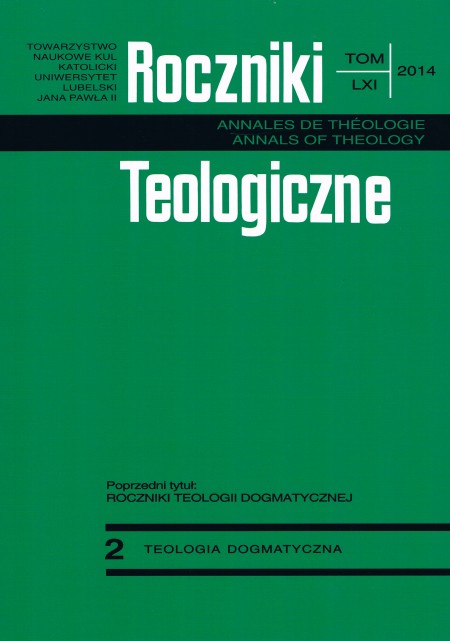Odnowa teologii episkopatu zaczynem doktryny kolegialności episkopalnej w analizie rozwoju teologii i wydarzeń Kościoła belgijskiego przed Soborem...
The Episcopate’s Revival of Theology as the Beginning of the Collegiality Doctrine in the Analysis of the Development of Theology and Events in /.../
Author(s): Artur A. KasprzakSubject(s): Christian Theology and Religion
Published by: Towarzystwo Naukowe KUL & Katolicki Uniwersytet Lubelski Jana Pawła II
Keywords: Episcopal collegiality; papal infallibility; ecumenical relations; D.-J. Mercier; L. Beauduin; Ordo Episcoporum; Chevetogne
Summary/Abstract: Many theological questions undertaken by the Second Vatican Council were the result of deep reflections from many years before that event. In the case of Episcopal collegiality the environment, theology and the events in the Belgian Church prove that this influence had a special role at that time. Episcopal collegiality in its beginnings is always connected with an attempt at introducing a revived vision of the Church. It is a vision, in which the will to serve the unity of Christians and a search for theological reflection based on the oldest Tradition of the Church should be present; it also should express the courage to undertake difficult subjects connected with the revival of the Church structure. The present study shows a special attitude of the great shepherds of the pre-Council Church in Belgium who strove towards such aims in their pastoral work. We show that such a role was played by: Cardinal Desire-Joseph Mercier, the Primate of Belgium, and Dom Lambert Beauduin, who established a community devoted to Christian unity at Chevetogne. These two figures are a model of work at the foundations of the vision of the Church living in a communion, in which bishops together with the Pope, and also among themselves, build responsibility for the Church. We show this awareness by analyzing the work of the circle of “the three thriving centers”: the diocesan, university and monastic ones. We present the basis of the same trend in reflections appearing in such circumstances as: the nine hundredth anniversary of the East-West schism of 1054, the broad debate on the sacramentality of the episcopate triggered by Father Beyer’s hypothesis, or in the context of the “Council movement” striving for strengthening the general convictions about the need to convoke a new Council.
Journal: Roczniki Teologiczne
- Issue Year: 61/2014
- Issue No: 02
- Page Range: 135-178
- Page Count: 44
- Language: Polish

